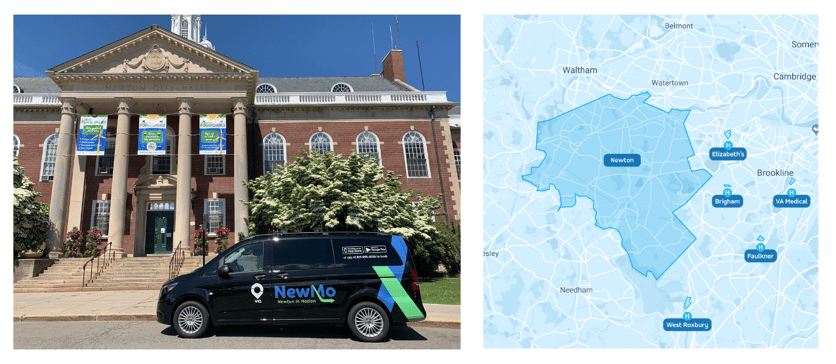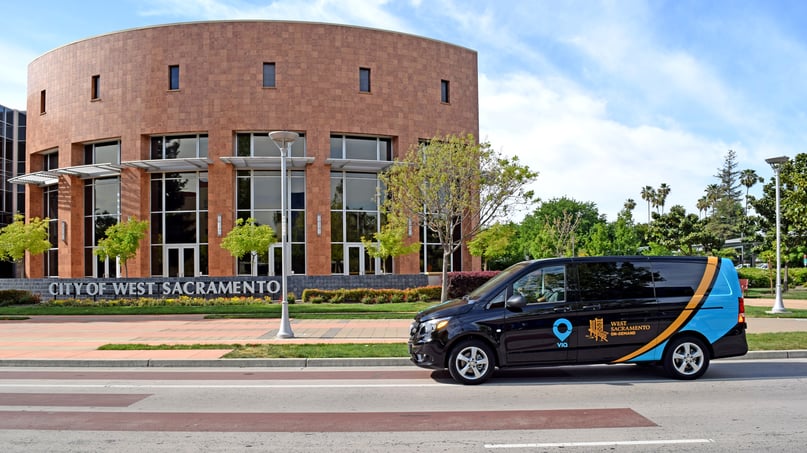Think about a grandparent walking a mile to the bus stop just to go grocery shopping. Or waiting 45 minutes in the rain for a late bus. Or climbing three flights of stairs at the bus station because it has no elevator. Or paying $40 for an Uber to play Bingo. The mismatch between aging populations and public transit capabilities is a real concern for city planners and transit agencies. Worldwide, people 65 and over are growing faster than any other age group. In the U.S., seniors will number 71.5 million by 2030, a figure that has nearly doubled since 2006. "I think they’re the best thing since bacon. They’re Johnny on the spot. When I need them, they’ve been available. I just need to run to the darn store for one darn thing, and here they are.” - Gail Hoffman The vast majority of these seniors want to “age in place,” or stay in their current home and community. But transportation makes this difficult. In fact, more than 50 percent of non-driving seniors don’t leave home at all most days, often due to a lack of transportation options.
Fortunately, new and better options are available and succeeding with seniors in all kinds of communities. Many cities today are investing in on-demand microtransit, which blends the best of public transport with ride-hailing’s most popular features. Travelers can request an inexpensive shuttle that picks them up within a few minutes. Vehicles are then dynamically routed to the final destination, picking up other travelers along the way who are heading in the same direction for efficient, shared rides. For seniors without access to mobility solutions or reliable paratransit networks, requesting a ride in real time can be a lifeline, restoring freedom for the price of a bus ticket — and in many cities, even less. 
NewMo brings on-demand transit to Newton
NewMo is an on-demand transit service available exclusively to seniors in Newton, Massachusetts to help any resident age 60 and older get to the senior center, doctors’ offices, places of worship, and other destinations throughout all 14 villages that make up the Newton area. Because it was designed for seniors, NewMo includes several distinct features. The previous “dial-a-ride” program required seniors to book trips 72 hours in advance — which is not ideal if you just ran out of milk or spontaneously decide to meet friends for lunch.
Compare that to an average wait time of just 11 minutes for NewMo. While NewMo supports ride booking through an app, it also allows seniors to book by phone, which 80 percent choose to do. All phone operators receive senior sensitivity training, and bi-lingual customer support staff are available for the large number of locals who speak Russian.
NewMo offers curb-to-curb and door-to-door service with a fleet that includes wheelchair accessible vehicles. All drivers are trained in high-touch support, so they know to open the sliding van door as riders walk up as well as proactively assist riders with their bags. So far, NewMo has been a hit with seniors, who have gained independence with access to flexible, on-demand transportation.
In just eight months since launching, the service delivered nearly 15,000 rides to local seniors, with a majority of trips helping passengers get to medical appointments and the local senior center. “This gives you some freedom,” said NewMo rider Phyllis Chmara. “This will be perfect for [Newton seniors]. They’re older, and they need help getting out. And [this service now means] they will have a way to do that.”

West Sacramento On-Demand show success of microtransit
Seniors have flocked to West Sacramento for its affordability since it was incorporated in 1987. One study estimated the population of seniors would grow 153 percent between 2000 and 2030. That’s why Mayor Christopher Cabaldon opened a senior center in 2011 and joined an AARP Network of Age-Friendly States and Communities in 2015.
Community surveys clearly showed that residents rated transportation as a key to local livability. But the city is too small to operate a bus service cost-effectively, so it sought out more innovative solutions. This led Cabaldon and other city leaders to Via and microtransit in 2017. The result of the collaboration is West Sacramento On-Demand, which combines the most attractive features of ride-sharing and city bus service.
Residents use an app or make a call to book a ride in a shared vehicle, and Via coordinates pickups and drop-offs for multiple passengers. Each one-way ride costs just $1.75 for seniors.
“I think they’re the best thing since bacon,” rider Gail Hoffman told the Sacramento Bee in the video above. “They’re Johnny on the spot. When I need them, they’ve been available. I just need to run to the darn store for one darn thing, and here they are.”
West Sacramento On-Demand averages 3,000 rides a week, 14 percent of which are taken by seniors or those with disabilities. Recently, one local senior told Mayor Cabaldon that she is finally able to buy ice cream again. Before the on-demand option was available, she had to take the bus to the store and the ice cream would always melt before she got home.
This is a small detail, but an important one. It encapsulates both the public transit reality for many communities—long waits and not enough choices—and a solution that can help more seniors age in place, engage with their community, and stay independent as long as possible.

.png?width=71&height=47&name=Sioux%20Falls%20Webinar%20(6).png)


